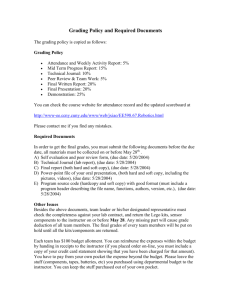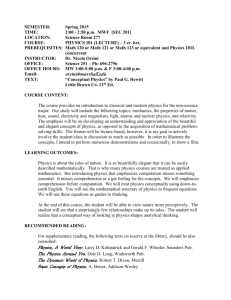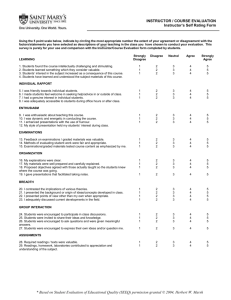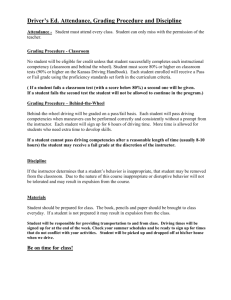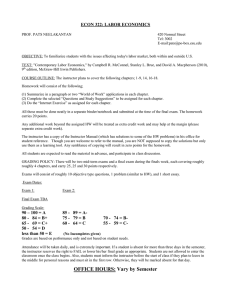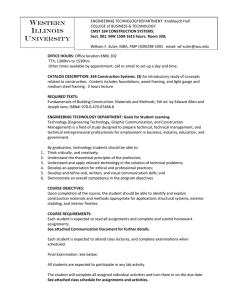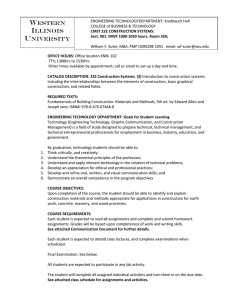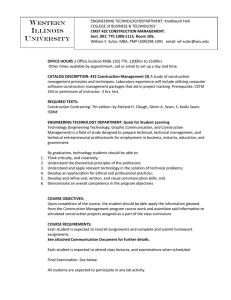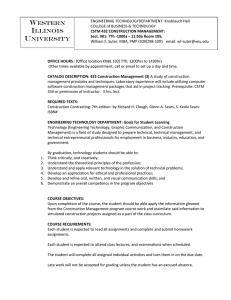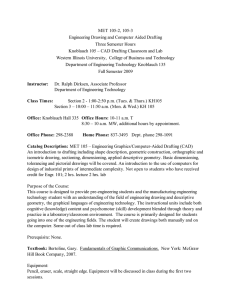syllabus - The University of Texas at San Antonio
advertisement
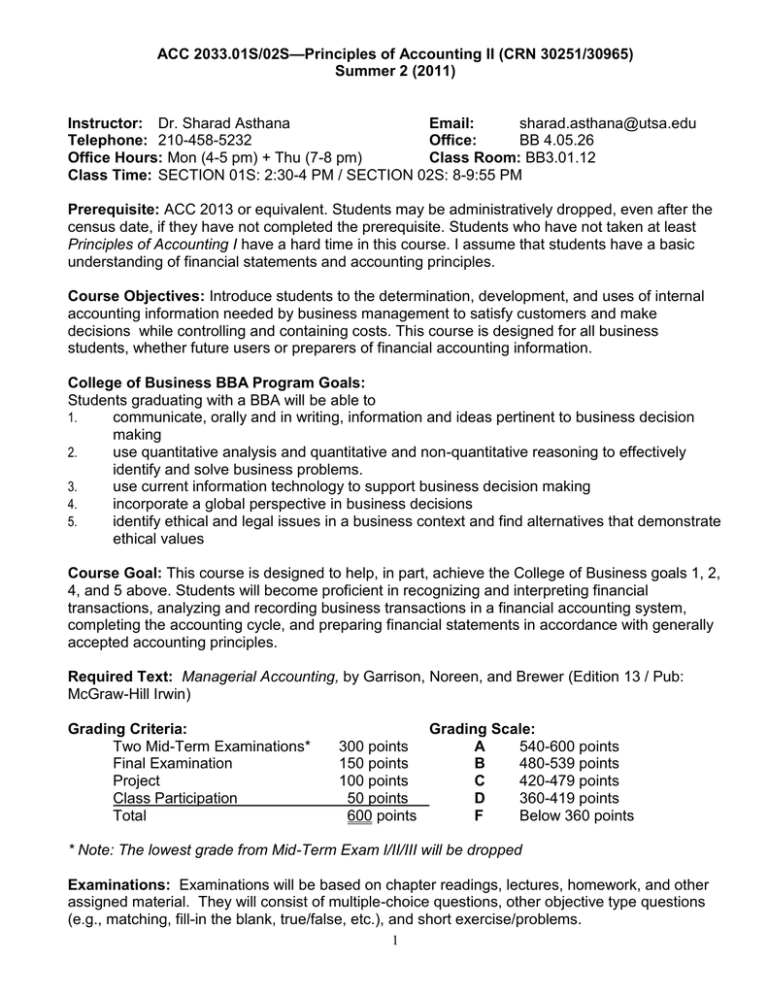
ACC 2033.01S/02S—Principles of Accounting II (CRN 30251/30965) Summer 2 (2011) Instructor: Dr. Sharad Asthana Email: sharad.asthana@utsa.edu Telephone: 210-458-5232 Office: BB 4.05.26 Office Hours: Mon (4-5 pm) + Thu (7-8 pm) Class Room: BB3.01.12 Class Time: SECTION 01S: 2:30-4 PM / SECTION 02S: 8-9:55 PM Prerequisite: ACC 2013 or equivalent. Students may be administratively dropped, even after the census date, if they have not completed the prerequisite. Students who have not taken at least Principles of Accounting I have a hard time in this course. I assume that students have a basic understanding of financial statements and accounting principles. Course Objectives: Introduce students to the determination, development, and uses of internal accounting information needed by business management to satisfy customers and make decisions while controlling and containing costs. This course is designed for all business students, whether future users or preparers of financial accounting information. College of Business BBA Program Goals: Students graduating with a BBA will be able to 1. communicate, orally and in writing, information and ideas pertinent to business decision making 2. use quantitative analysis and quantitative and non-quantitative reasoning to effectively identify and solve business problems. 3. use current information technology to support business decision making 4. incorporate a global perspective in business decisions 5. identify ethical and legal issues in a business context and find alternatives that demonstrate ethical values Course Goal: This course is designed to help, in part, achieve the College of Business goals 1, 2, 4, and 5 above. Students will become proficient in recognizing and interpreting financial transactions, analyzing and recording business transactions in a financial accounting system, completing the accounting cycle, and preparing financial statements in accordance with generally accepted accounting principles. Required Text: Managerial Accounting, by Garrison, Noreen, and Brewer (Edition 13 / Pub: McGraw-Hill Irwin) Grading Criteria: Two Mid-Term Examinations* Final Examination Project Class Participation Total 300 points 150 points 100 points 50 points 600 points Grading Scale: A 540-600 points B 480-539 points C 420-479 points D 360-419 points F Below 360 points * Note: The lowest grade from Mid-Term Exam I/II/III will be dropped Examinations: Examinations will be based on chapter readings, lectures, homework, and other assigned material. They will consist of multiple-choice questions, other objective type questions (e.g., matching, fill-in the blank, true/false, etc.), and short exercise/problems. 1 Project: During the term there will be a Project worth a total of 100 points. Specific requirements, including due dates, will be distributed during the term. No late projects will be graded. Extra Credit: Students will earn a grade based on the grading criteria stated above. Accordingly, there will not be any extra credit. Attendance: Attendance is required for the lectures; excessive absences may result in the instructor lowering the student’s grade. Homework/assignments should be prepared prior to class. As stated in the catalog, “It is the student’s responsibility to drop a course by the appropriate deadline. Faculty and staff will not drop a student from a course automatically for nonattendance; the student must initiate the process and complete any steps to ensure that the class is dropped. If a student fails to drop a course, even if the student does not attend the course, he/she will receive a grade of “F” in the course.” Online Resources: In addition to the course resources (PowerPoint, Solution Manual, etc.) available on the Course Website. The textbook publishers have provided various additional resources at their website. The resources include multiple choice quizzes, true-false, check figures, crossword puzzles, etc. to assist the students in understanding the material. Academic Dishonesty: Students are expected to be above reproach in scholastic activities. Students who violate University rules on scholastic dishonesty are subject to disciplinary penalties, including the possibility of failure in the course and dismissal from the University. Students are expected to follow the UTSA Honor Pledge: "On my honor, as a student of The University of Texas at San Antonio, I will uphold the highest standards of academic integrity and personal accountability for the advancement of the dignity and the reputation of our university and myself." Disturbances: Out of respect to your colleagues and instructor, cell phones and pagers should be turned off or put on vibrate mode during class time. Should the occasion arise that you need to respond to a phone call or page, please leave the classroom quietly and conduct your business in the hall. Disability Services: Support services, including registration assistance and equipment, are available to students with documented disabilities through the Office of Disability Services. Students are encouraged to contact the office located at MS 2.03.18 (458-4157) or BV 1.302 (458-2945) to make arrangements. Note: The syllabus is tentative and based on the best information available at the beginning of the semester. The instructor reserves the right to change the contents of the syllabus if the events dictate. 2
